Institutional Context
Summary
Bournemouth University’s vision is to inspire learning, advance knowledge and enrich society through the fusion of education, research and professional practice.
As the largest Higher Education Institute in Dorset, we are proud of our contribution to the region, acting as a catalyst for growth, raising aspirations and supporting economic activity.
At regional, national and international levels, we work with businesses, healthcare providers, third-sector organisations and government bodies to share expertise and gain insights that shape our education and research, providing solutions to societal challenges across six key strategic areas.
As well as co-creating research with our staff, every undergraduate student has the opportunity to undertake a work placement, further developing their professional skills and enhancing their career prospects.
Institutional context
At Bournemouth University (BU), our motto is Discere Mutari Es - to learn is to change. This runs through everything we do – co-creating knowledge with, and for, the wider community to change perceptions, policies, practices, and lives.
Our institutional strategy, BU2025, outlines our vision to inspire learning, advance knowledge and enrich society through Fusion – where professional practice, research and education combine to create something greater than the sum of its parts.
We work with businesses, healthcare providers, third-sector organisations and government bodies to share expertise and gain insights that shape our education and research, providing solutions to societal challenges.
This drives activity across six key strategic areas, tackling some of the biggest issues facing our world – from healthy ageing to protecting our environment, supporting marginalised communities, and responding to crisis.
These were developed through extensive consultation across BU and with key partners and stakeholders, ensuring alignment with regional and national priorities:
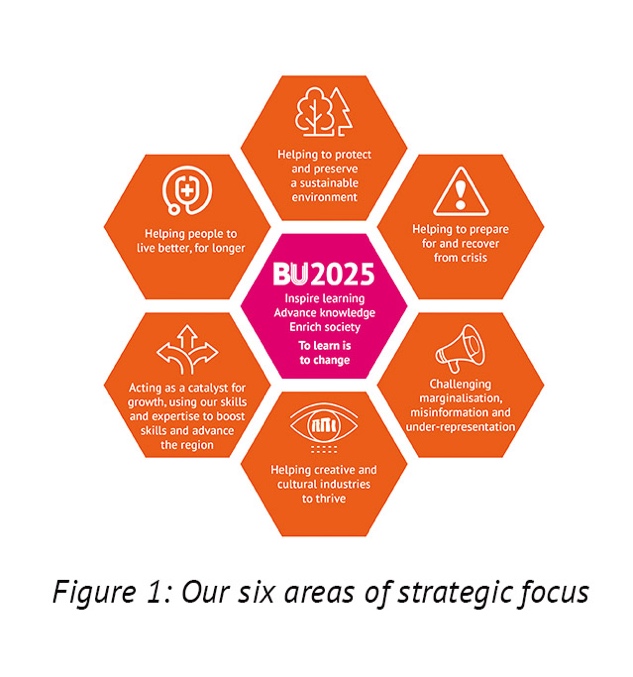
While our community of 19,000 students join us from across the globe, 32% come from less than 40 miles away. Our outreach activity in schools and colleges raises aspirations and supports students from under-represented areas.
40% of Dorset’s population will be aged over 60 by 2025 (Dorset LEP), providing a unique testbed for policies and best practice to support an ageing global population.
BU’s work with health and care providers, including partnerships with University Hospitals Dorset and Dorset Healthcare, supports initiatives across research, education and practice to help people live better for longer. This includes student placements and Continuing Professional Development (CPD) for staff, alongside joint research across areas including workforce retention, treating osteoarthritis, and optimising ward layouts.
Our 65-acre sports campus Chapel Gate is at the heart of local sporting activity and home to eight community clubs, with 3,000+ visitors each week.
Dorset’s natural capital is worth £1.5 billion annually, with two thirds of Dorset designated as Areas of Outstanding Natural Beauty (Dorset LEP). We are passionate about protecting our environment and our work with partners including the National Trust involves students in monitoring and supporting important habitats, such as Arne Nature reserve.
Dorset has a strong creative and digital sector, identified in Dorset LEP’s Strategic Economic Vision as a high-value sector with growth potential - noting BU’s leading reputation. From training Oscar-winning graduates to using augmented reality to enhance visitor experiences, we help cultural and creative industries thrive.
Our collaborations also have an international reach – from working with young refugees in Turkey and Bangladesh to develop digital skills, to our Disaster Management Centre assisting communities globally in crisis preparedness and recovery.
Regionally, nationally and internationally, we strive to be a catalyst for sustainable social, environmental and economic growth – advancing knowledge, creativity and innovation (BU2025). This vision is at the heart of our knowledge exchange activities.
For further information, please send queries to research@bournemouth.ac.uk
Local Growth and Regeneration
Summary of approach
Bournemouth University’s (BU) vision is to inspire learning, advance knowledge and enrich society through the fusion of education, research and professional practice. As the largest university in Dorset, we are proud of the significant contribution we make to our region and beyond, acting as a catalyst for local growth and regeneration.
Our institutional strategy, BU2025, prioritises local growth and regeneration through close partnership working with our key regional stakeholders, investing in intellectual and physical capital to transform the regional R&D ecosystem, enriching the region through physical regeneration, and ensuring our excellence in knowledge exchange is of benefit to our global partners.
Aspect 1: Strategy
Our strategic approach to local growth and regeneration
Bournemouth University’s (BU) strategic plan, BU2025, drives local growth and regeneration by acting as a catalyst for sustainable social, environmental and economic growth and development, and enriches society by having a significant impact on challenges world-wide.
We are committed to furthering the UN Sustainable Development Goals, utilising our strengths in knowledge exchange to actualise this vision and deliver local growth and regeneration.
Our strategy places explicit focus on delivering local growth and regeneration through the following tenets:
Working in partnership with key regional stakeholders to identify and address regional challenges
Developing strategic partnerships for regional impact and global reach
Investing in intellectual and physical capital to transform the regional R&D ecosystem
Enriching the region through physical regeneration
Using knowledge exchange for global regional growth and regeneration
Geographies of impact
BU’s locality is shaped by our south coast geography and close alignment with regional stakeholders (including Dorset Local Enterprise Partnership {DLEP}; regional Chambers of Commerce; Bournemouth, Christchurch and Poole Council; Dorset Council; industry partners such as AFC Bournemouth; University Hospitals Dorset; and regional HEPs including Arts University Bournemouth and AECC University College).
Our impact extends beyond the county boundaries of Dorset, covering higher education/innovation cold spots with a reach into surrounding regions, with BU sites in Somerset and Hampshire.
In addition to our impact on the region, we draw on our strengths in knowledge exchange to enable local growth and regeneration in localities aligned with our Global Challenges Research Fund (GCRF) strategy, specifically in Sub-Saharan Africa.
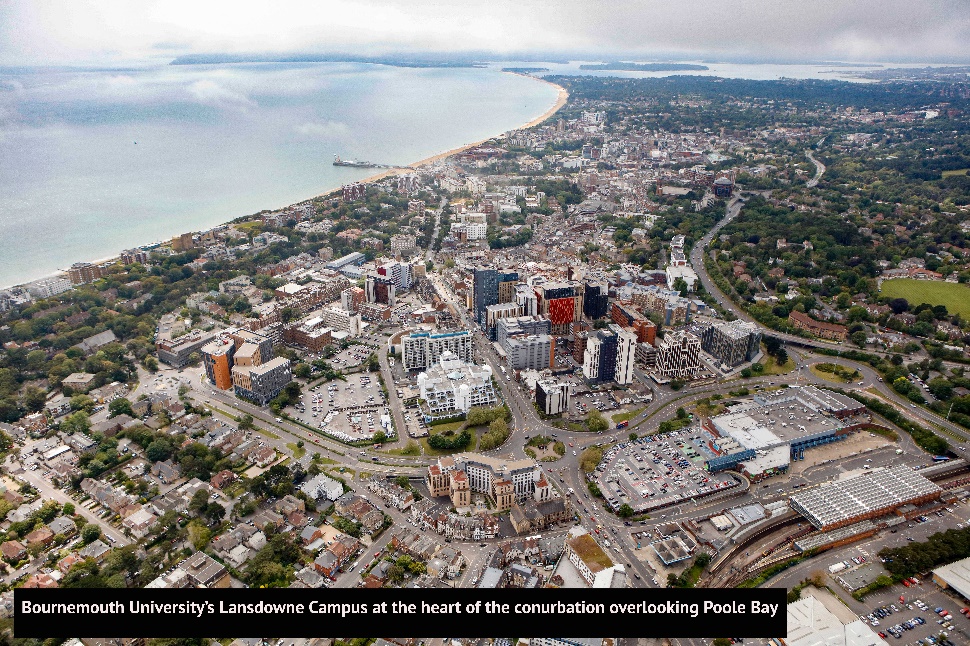
Informing our strategy
BU has worked in partnership with stakeholders to ensure our approach is informed by regional growth and regeneration needs. For instance, we host the Dorset Local Enterprise Partnership (DLEP) on our Talbot Campus and ensure there is a formal opportunity to engage with priority challenges for the region.
To support the development of Dorset’s Local Industrial Strategy, we provided research and analytical expertise via the Office of the Vice-Chancellor, including economic analysis of the regional economy. BU has been directly involved in Dorset Living Better, (our regional investment prospectus) and in the development of the Dorset Skills Action Plan, which sets ambitions to increase the attraction, retention, and progression of new-growth talent in the region.
We also supported the Dorset Local Skills Report and BU staff provided insight into the current labour market landscape in Dorset. Furthermore, we have been involved in the merger of two NHS Foundation Trusts to create University Hospitals Dorset, covering a population greater than Bristol.
Our proactive approach and close working relationship with stakeholders ensures that our strategic approach is informed by current regional needs. We also ensure that we work directly with beneficiaries of our activities, for example through our Public Involvement in Education & Research team and public engagement activities, to further enrich our strategy.
Local growth and regeneration informing institutional strategy
BU is proud of our long history and impact on our region, with our contribution to local growth and regeneration an integral part of our institutional mission and vision. Our organisational roots date from the 1900s, to our position today as an anchor institution, providing skilled graduates and a focus for R&D activities in the region. Our approach to local growth and regeneration is intertwined with our wider organisational strategy and plans for institutional growth.
We recognise that the evolution of our pedagogy is essential for the development of skills in the sectors most in need within the region (such as the creative industries). As a large university with a broad disciplinary base and growing excellence in research, we are well placed to meet regional needs and to support growth.
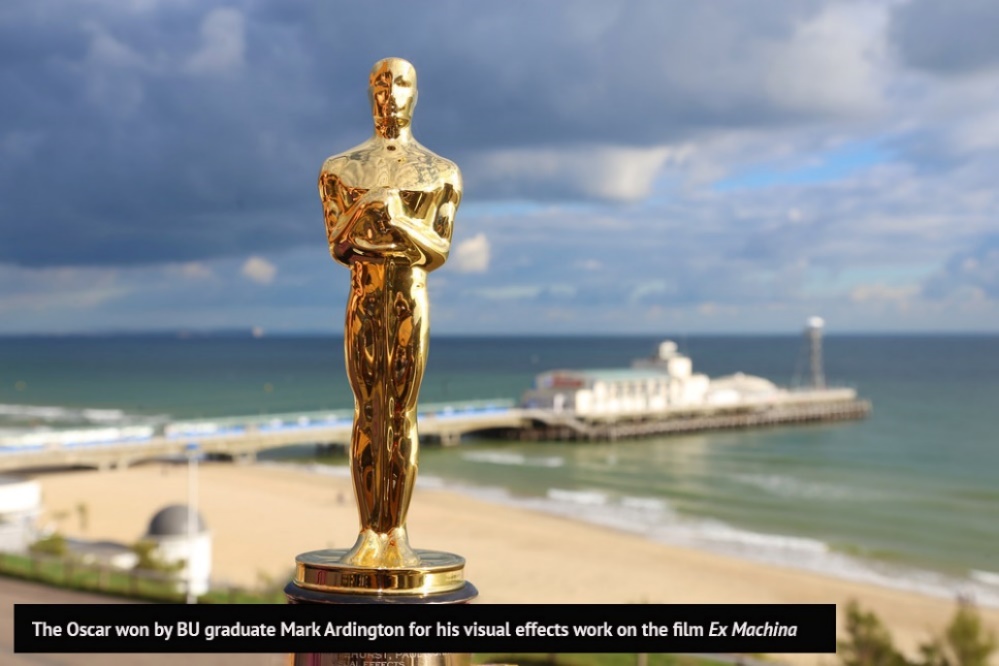
Aspect 2: Activity
Working in partnership with key regional stakeholders to identify and address regional challenges
Enabling regional growth
We operate at a strategic and operational level with our closest local authorities (Bournemouth, Christchurch & Poole {BCP} Council and Dorset Council), supporting their planning, culture and the leadership teams. For example, BU helped shape BCP’s skills plan 2022-2026, supported the creation of their corporate strategy and contributed to the successful £22m towns fund bid.
We supported Dorset Council in determining their economic growth strategy and we have been part of the Dorset Festival of the Future for several years. Engagement with these activities ensures the knowledge embedded within the University contributes directly to our regional economy.
Addressing the challenges associated with our demography
BU has established partnerships with regional health and social care partners to develop a strategic approach to addressing shared challenges. This is fundamental to the region as Dorset faces some significant challenges in relation to health and a rapidly ageing population, ahead of the national trend.
Although our ageing population challenges the region’s ability to grow from an economic perspective, it also provides an innovation test bed which we are utilising through our partnership working. For example, we have a successful programme with University Hospitals Dorset (UHD) which is enabling greater challenge-led R&D activities, addressing the skills gap and retaining talent within the region.
Development of strategic partnerships for regional impact and global reach
Corporate partnerships for regional benefit
BU builds corporate partnerships to maximise the impact within our region, leveraging our position as a growing university to link our locality to sites and partners worldwide. This includes our partnership with AFC Bournemouth, established for over a decade, which enables opportunities for training, skills development and research priorities. For example, as part of BU’s Big Match activity, AFC Business and the University collaborated to match local businesses with potential employees.
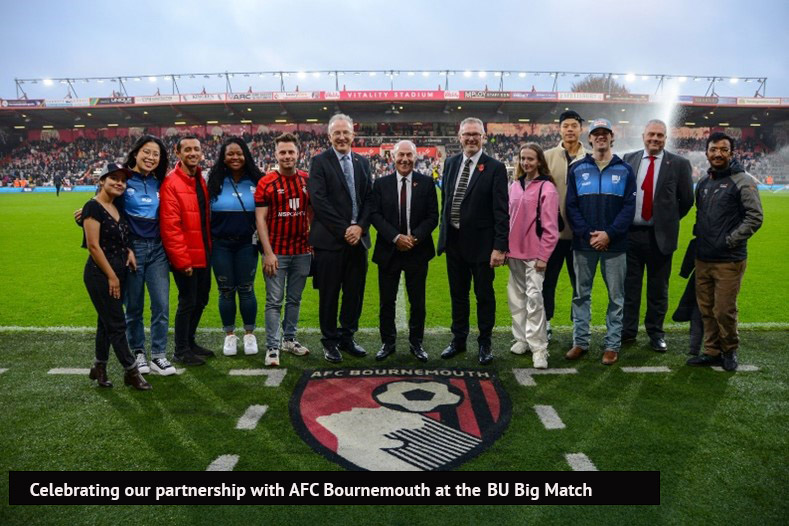
BU’s partnership with UHD and other NHS partner organisations is pioneering solutions to address health and social care challenges through innovation and attracting/retaining a skilled workforce to the region. This is enabling the organisations to leverage funding for research and innovation, furthering the regional R&D system to contribute to economic growth.
Strategic networks to enrich our region
We are proactive in ensuring that our academic knowledge base directly benefits our region. For example, c.60 SME owners have so far participated in the University’s Help to Grow: Management Programme with participants using this professional development to growth their businesses.
We link the skills base developed by our students and graduates to regional industries through programmes of events and activities. This includes our annual careers fairs (the last had over 100 employers and c.4,200 students attend), and our Graduate Skills Programme, which delivers masterclasses and industry visits (supported by partners including Lush and Dorset Mind). The BU Eco Entrepreneurs Fund has helped sustainable SME businesses with funding, networking and confidence boosting opportunities.
BU provides targeted support to the digital and creative industries, which is one of the biggest areas of economic growth within the region. Many BU graduates have remained in the area, working for businesses such as LoveLove Films and Outpost VFX, which is essential for the onward growth of the creative industries in the region.
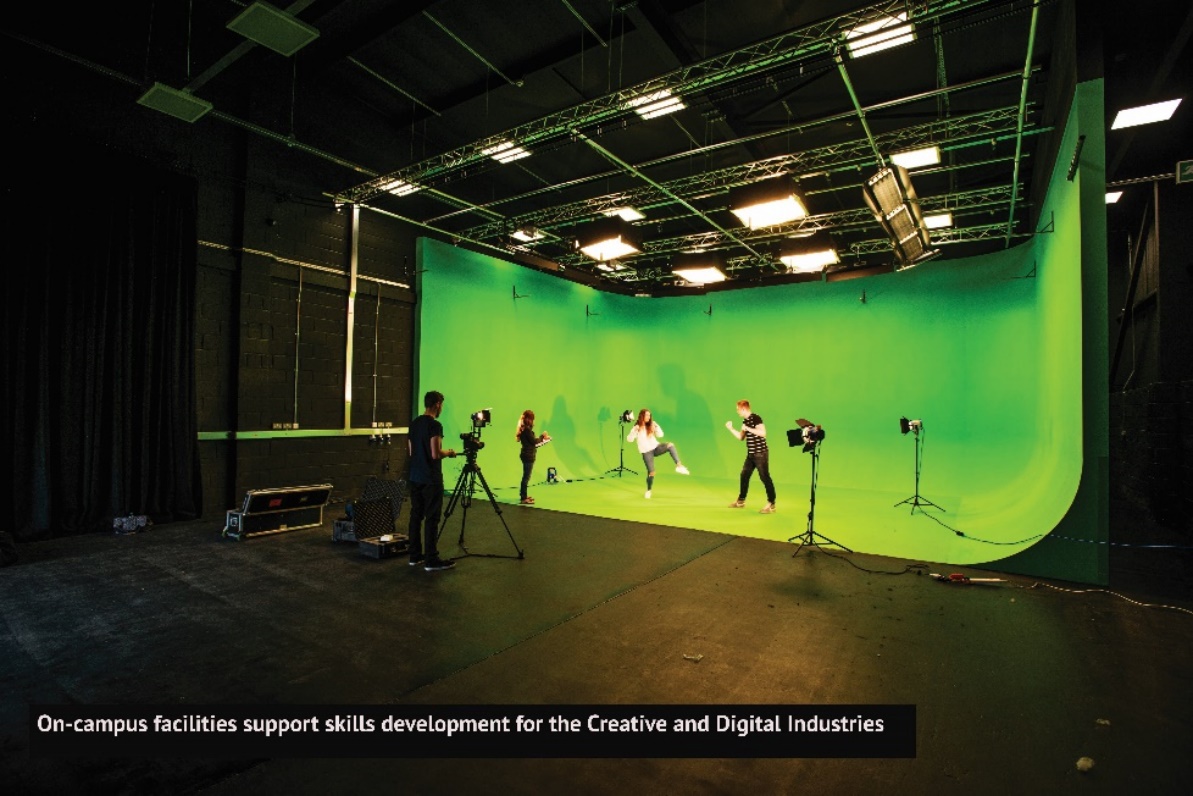
Investment in intellectual and physical capital to transform the regional R&D ecosystem
Local Growth Deal funding
Our strategic plan is aligned to Dorset’s Local Industrial Strategy, and we have continued to invest to bring state-of-the-art expertise and technology to the region. For example, we have utilised Local Growth Deal funding to create the Institute of Medical Imaging & Visualisation. Enabling the purchase of new technologies (including an MRI scanner) has leveraged Innovate UK funding in partnership with med tech companies, helping to address regional health challenges. The Institute is also addressing social mobility by encouraging high-level technical education, which provides local employers with skilled technicians and addressees the skills gap in higher level technical provision.
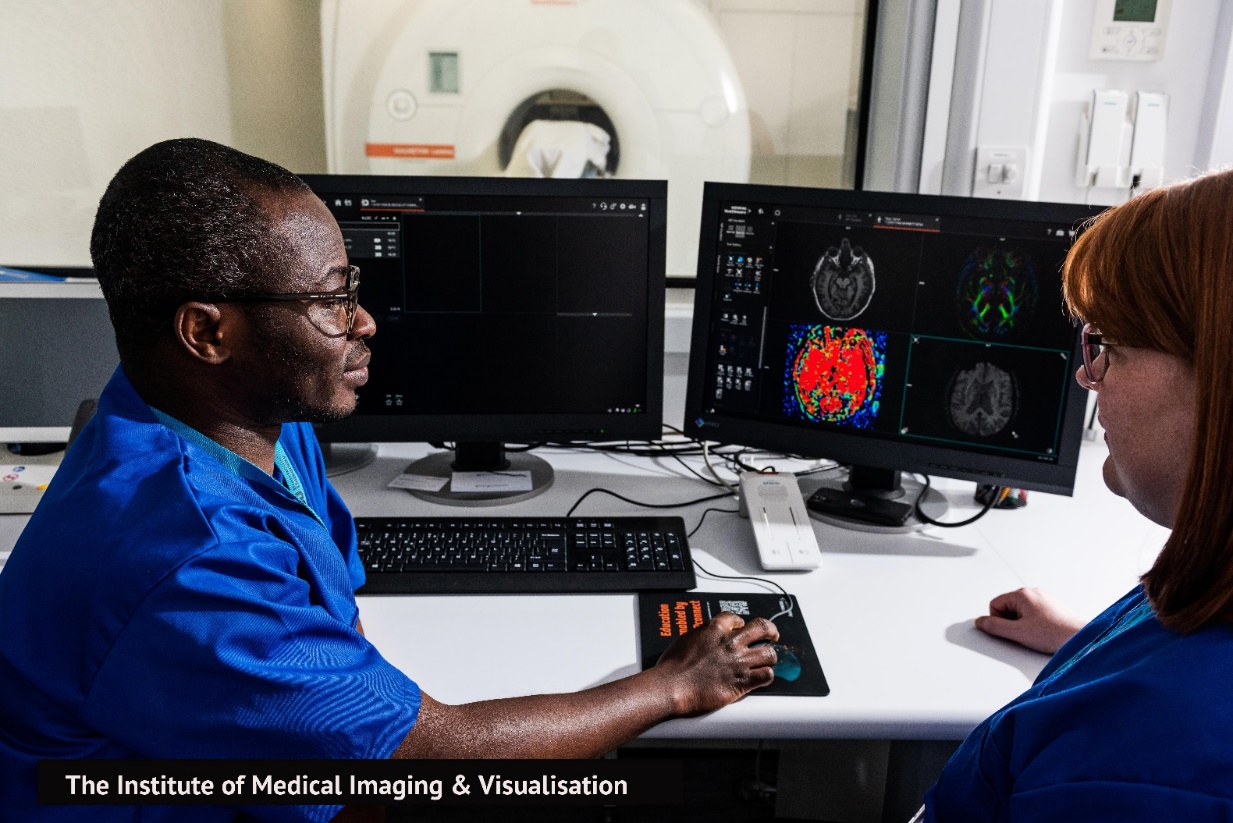
Local Growth Deal funds have supported the Orthopaedic Research Institute, which, through programmes of research, is positively impacting the region through improved health outcomes (for example, the Cycling Against Hip Pain (CHAIN) programme). Furthermore, ORI leveraged Innovate UK funding with local companies Buckingham Healthcare (on the design and development of their Glideboard siding seat wheelchair transfer board) and Iceberg Creative (on robotic simulation).
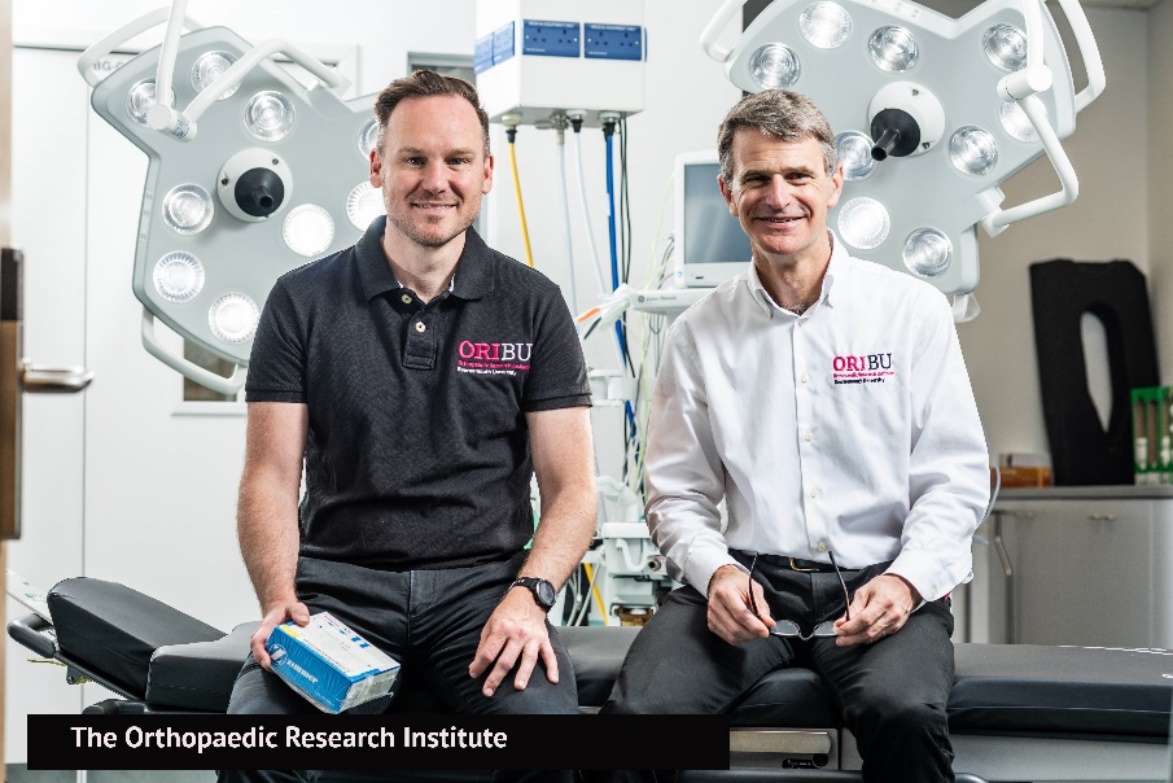
Growing academic expertise
BU’s continual growth in research strength (for example, we submitted more than three times as many staff to REF2021 compared to REF2014) has directly benefitted the region. This growth has enabled BU to become part of the 5G RuralDorset consortium that included Dorset Council and Vodafone and secured £7m to focus on how Dorset rural communities could benefit from next generation mobile connectivity (January 2020 to June 2022). The multi-award winning project included University support to monitor land stability and cliff movement at key points along the Jurassic Coast.
Furthermore, we have used internal funding to pump-prime innovation partnerships with regional partners, which further boosts local economic growth. For example, we have utilised Research England capital funding to ensure that our laboratories provide state-of-the-art R&D facilities, such as the ADDISONIC laboratory for advanced manufacturing.
Our investment and commitment to leveraging R&D funding contributes to local growth in addition to the development of new technologies. We are investing in commercialisation expertise and partnering with organisations such as the Dorset Innovation Hub and the Wessex Academic Health Science Network to ensure the knowledge created within the University can make a direct contribution to local growth.
Enriching the region through physical regeneration
BU’s estate
Our physical estate is prominent across the conurbation in which the University is situated. Extensive development and refurbishment have taken place across our campuses in Poole and Bournemouth, enriching the region with the infrastructure for skills development whilst contributing to wider programmes of urban regeneration. For example, in 2021, we opened the new Bournemouth Gateway Building which has a total estates and equipment investment of c.£50m. The specialist facilities include simulation rooms such an operating theatre and a community home environment. This supports the extensive CPD we undertake with the NHS, including over 32,000 learner days over the past three years.
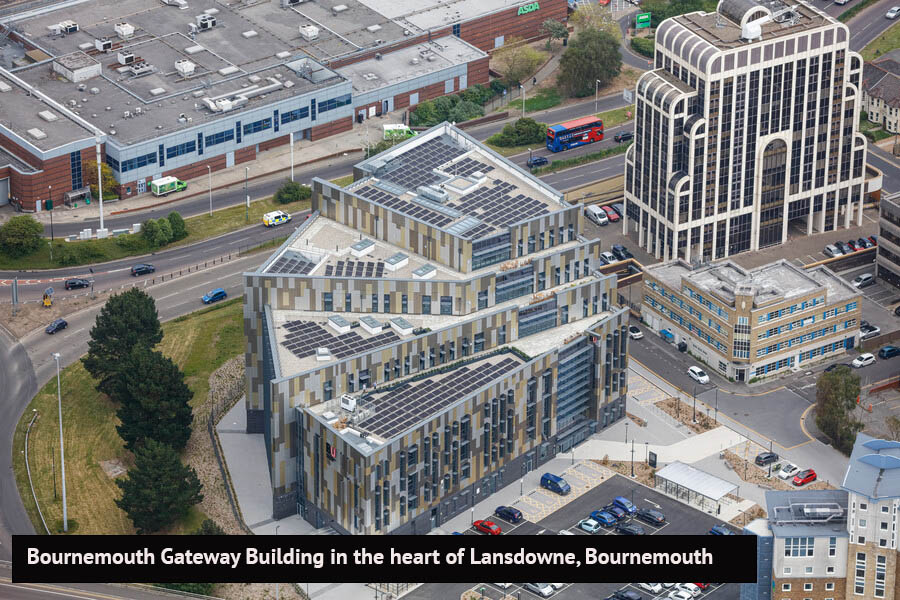
Expertise for physical regeneration
We are creating a more environmentally friendly and biodiverse campus, continually improving our space and buildings, and supporting a sustainable community. Our Climate and Ecological Crisis Action Plan (CECAP) sets out our vision to achieve net zero emissions by 2030/31 across all our activities.
We are proud to enable our academic community to ensure their expertise benefits the region. Our expertise in environmental science is helping to protect the extraordinary natural environment within our locality, balancing the needs of the tourism industry. For example, utilising Interreg funding, we have installed 3D printed artificial reef units in Poole Harbour to provide new habitats helping marine wildlife recover from damage to the seabed.
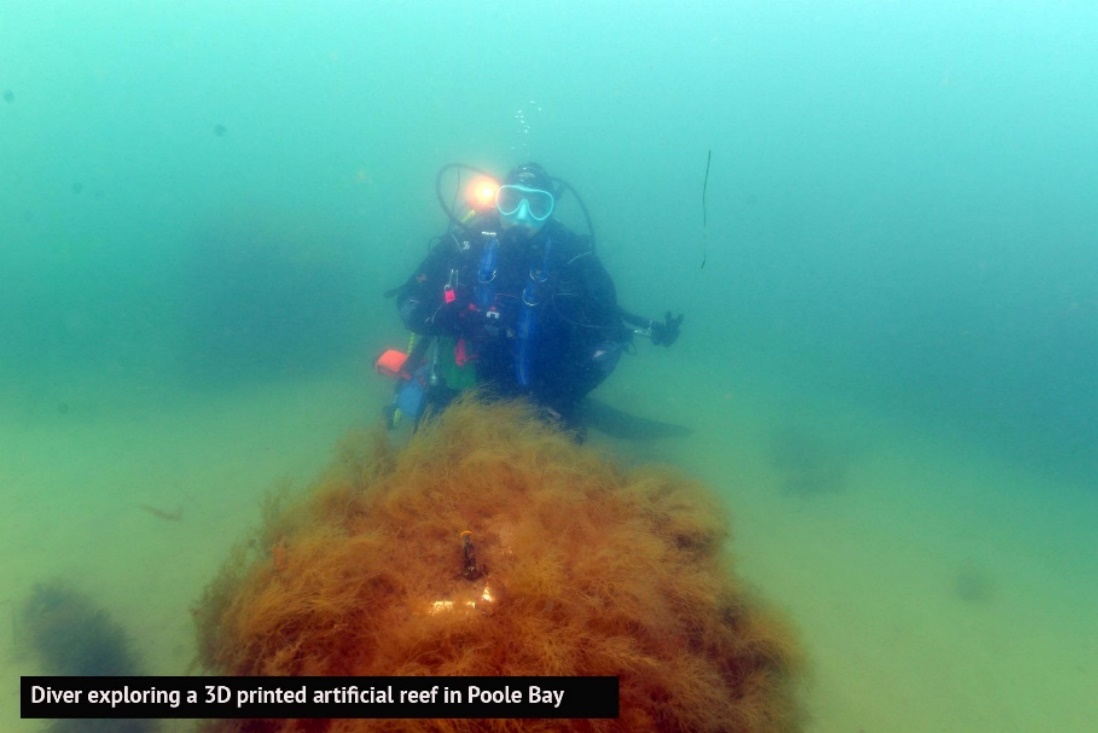
Furthermore, we ensure our knowledge supports the leveraging of regeneration funds to the area. For example, BU research raised awareness of the importance of piers and how they can help regenerate seaside communities, which supported BCP Council to secure £18.2m in government funding that will rejuvenate Bournemouth and Poole’s seafront.
Using knowledge exchange for global regional growth and regeneration
Further to the impact that BU has on our immediate locality within Dorset, as an institution we are committed to ensuring that we impact local growth and regeneration through knowledge exchange globally, as documented within our Global Challenges Research Fund (GCRF) Strategy. For example, within Sierra Leone, our AFRICAB project has created standard operating protocols for improving urban resilience and waste management, enabling regeneration of Freetown. Furthermore, the knowledge exchange work with teams in Freetown through the EVALDIS project has enabled disaster management (for example, with regards to flooding/urban fires) which is imperative for securing urban regeneration and with it sustainable regional growth.
Aspect 3: Results
As a university, BU has grown considerably since 1992, with our growth in academic expertise contributing to an improved R&D ecosystem within the region and greater access to education and skills development. Across the past three years, we have updated our institutional approach to all our external engagement activities, with centralised leadership from the Office of the Vice-Chancellor and with greater regional engagement now enabled by dedicated business development managers.
We assess our programmes of activity through engagement with our stakeholders and by monitoring relevant education and R&D metrics. These need to be understood within our regional context, i.e. with weaker economic performance than much of the UK; however, they remain an important indicator of the value of activities associated with contributing to regional growth and regeneration. Over the past three years, examples include:
Leveraging £1.05m European Regional Development Funding (ERDF) via the European Commission
Leveraging £0.92m Innovate UK funding via KTPs and the CyberASAP programme
Demonstrable return on Local Growth Fund investment (via DLEP) indicating:
8.2 direct jobs created (4 indirect jobs created)
9 enterprises receiving non-financial support
5,000 square meters of new learning floorspace
£2.14m of third sector funding leveraged
£1.17m GVA from salaries to local economy
C.60 businesses engaged with the Help to Grow: Management Programme
Delivery of apprenticeships including:
177 apprentices on the Level 7 Advanced Clinical Practitioner MSc (the only Enhanced Clinical Practitioner Pathway for the south).
98 apprentices on the Level 6 Registered Nurse Adult Nursing/Mental Health Nursing BSc
14 apprentices on the Level 7 Senior Leader Postgraduate Diploma/MBA
Our approach to regeneration of the built environment contributed to the university being ranked 13th in the world and 1st in the UK in the THE impact rankings for our contribution to UN Sustainable Development Goal 13: Climate Action.
HE-BCI data indicates that over the past three years we have undertaken:
£3.47m in contract research
£1.34m in consultancy
£9.08m in CPD
As the University, and the expertise within it, has grown and changed significantly over the past three years, we have recognised the need to change how we communicate the value that we offer to our region.
As such, we undertook a comprehensive audit of the strengths of the organisation and used this to transform our communications into challenge-driven strategic narratives, which can be summarised as follows:
Acting as a catalyst for growth, using our skills and expertise to boost skills and advance the region
Challenging marginalisation, misinformation and under-representation
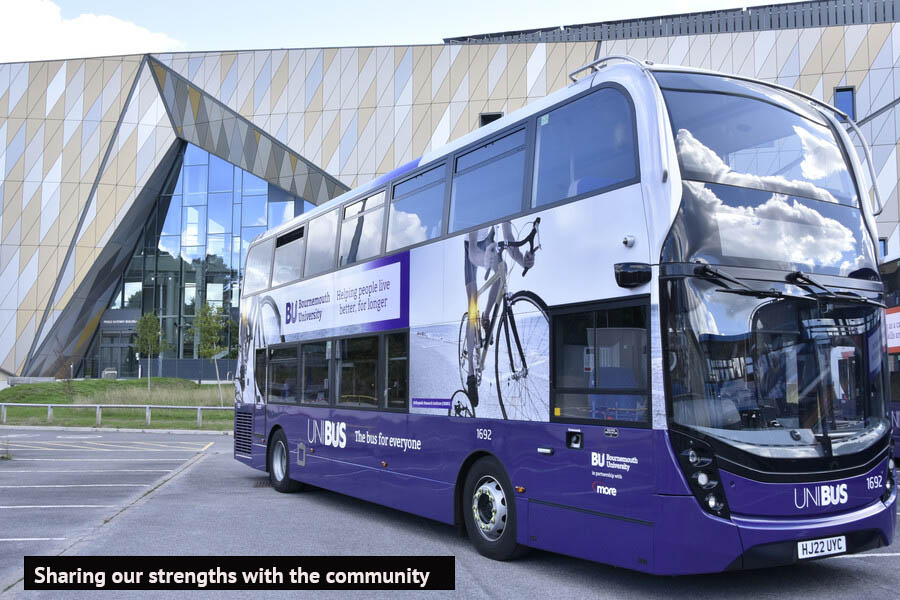
To showcase our expertise in the region, we highlight these six key areas in local media and physical assets, such as our fleet of UniBuses and campus hoardings – showcasing how they are of benefit to society. Media coverage, which shows BU's expertise, is tagged through our media monitoring system to track progress and help understand how our strengths are being communicated to our key regional communities.
Number of regional media mentions per narrative
The demonstration of the value we offer to the region, coupled with recent investment in business development roles in our faculties, means we are continuing to grow our contribution to local growth. As our approach matures, so does the framework by which evaluate the success that we have, including the outcomes and impacts of our activities.
Public & Community Engagement
Summary of approach
Bournemouth University’s (BU) approach to Public and Community Engagement (P&CE) is driven by our strategic plan: BU2025 and our commitment to inspiring learning, advancing knowledge and enriching society.
Engagement with publics and communities takes place across the institution with BU staff, students and graduates working together with regional, national and international partners across many sectors to make an impact on the world around us – aiming for a more sustainable, inclusive and healthy society.
Aspect 1: Strategy
Bournemouth University’s (BU) Public and Community Engagement (P&CE) activities align with our institutional strategy: BU2025, which commits to inspiring learning, advancing knowledge, and enriching society. By fusing education, research, and professional practice we make an impact on the world around us – aiming for a more sustainable, inclusive, and healthy society. Our work is grouped into six strategic areas reflecting our strengths and achievements, as summarised below. These were developed after consulting with key partners and stakeholders and help us to engage with our audiences.
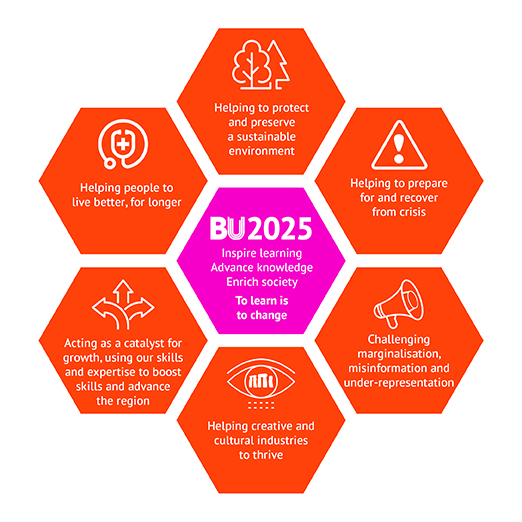
The University Leadership Team, led by the Vice-Chancellor, monitors progress towards BU2025. The strategy includes an implementation plan with measurable actions that shape our approach to P&CE. These include:
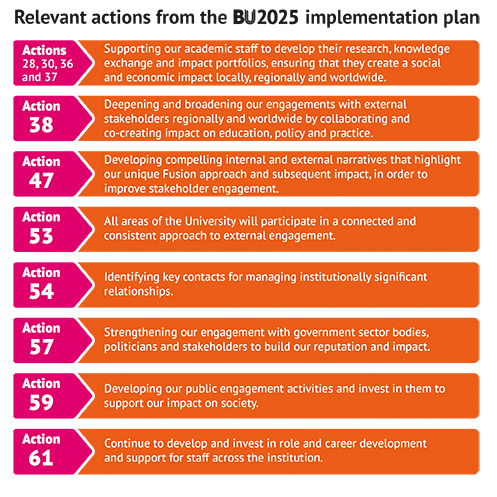
BU2025 Key Performance Indicators (KPIs) include societal impact measures, such as public event attendance and community investment. Our Higher Education - Business Community Interaction (HE-BCI) survey data (2021/22) shows 2 million+ engagements with public events, and 1,400+ staff hours delivering P&CE activity annually, surpassing KPI targets.
Our External Engagement strategy is informed by regional priorities, including the Dorset Local Enterprise Partnership (LEP) strategic economic plan and vision, and local industrial strategy. It encompasses six areas, including public, community and cultural engagement.
The External Engagement Management Group (EEMG) oversees external engagement, supported by four subgroups as shown below. The Public Engagement Subgroup (PESG) advises on public engagement objectives and deliverables to ensure best practice and encourage a positive culture.
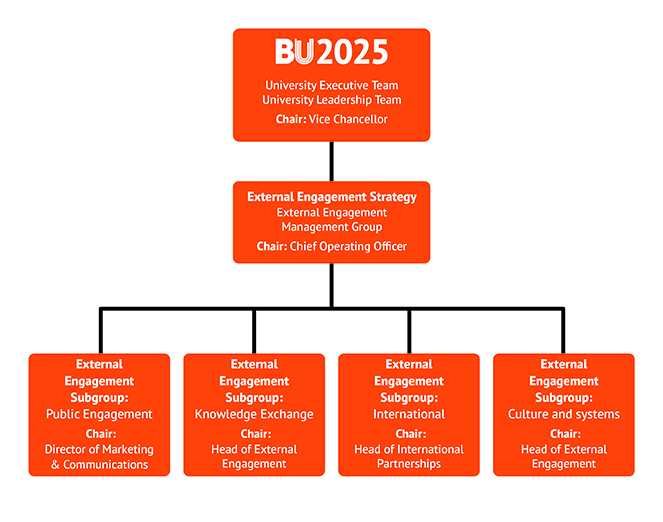
Local strategies are aligned to BU2025 and BU’s External Engagement plan, for example:
BU’s Public Involvement in Education and Research (PIER) Strategy 2020-2025 aims for people with lived experience to play an integral role in all stages of the student journey, education, and research cycle at BU. We emphasise inclusive models of collaboration which involve marginalised and seldom heard groups as equal partners. The strategy was developed in 2019 collaboratively with community members and embeds the community voice at the heart of education and research.
BU’s Public Engagement with Research (PER) action plan outlines objectives, activities, outcomes and success measures for embedding engaged research at each stage of the research cycle. We recognise that non-academic voices are vital to research design and implementation, enhancing research quality and the application of findings to make a difference. Central initiatives and targeted support build researchers’ skills and confidence to engage with partners, stakeholders, and the public.
BU collaborates with local organisations for wider community benefit. An account management approach provides partners with a designated point of contact.
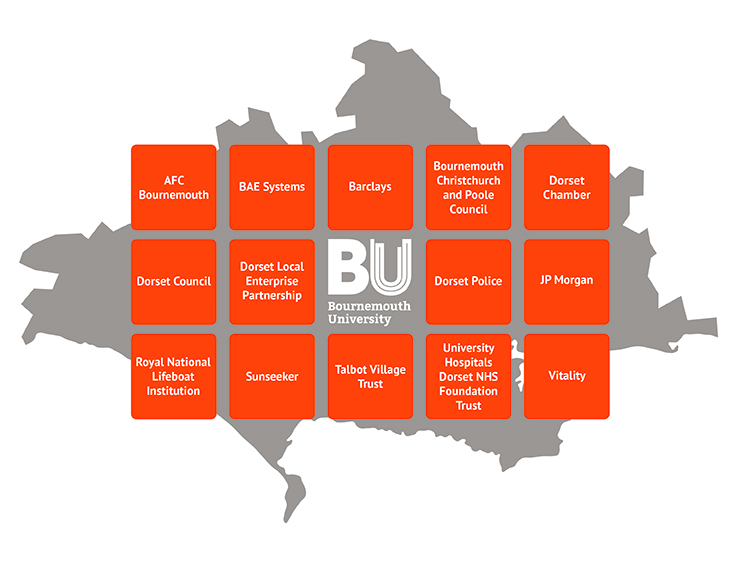
P&CE is funded from BU’s core budget, subsidised by QR, Participatory Research, Global Challenges Research Funding (GCRF) and Higher Education and Innovation Funding (HEIF) allocations. Circa 20% of our annual HEIF-6 budget (2017-2022) was invested in P&CE, highlighting its significance in achieving our HEIF-6 strategy. External grants, for example from the Economic and Social Research Council (ESRC) for the annual Festival of Social Science and from the Royal Society of Biology for the annual Dorchester Family Science Festival supplement BU’s investment.
Aspect 2: Support
Support for P&CE
P&CE is supported by expert teams in professional services and academic faculties, including:
BU’s PIER Partnership connects staff and students with 100+ organisations and members, who are experts by experience in health and social care. The PIER Partnership is a founding member of the VOICE UK Collaboration Network, a digital platform which brings together academic researchers and people with lived experience. With over 8,000 members, VOICE has extended our reach beyond the local community and increased the diversity of voices.
BU’s central Research Development and Support (RDS) team provides institution-wide support for PER and research impact. They facilitate training, support external research bidding with expertise on engagement and impact, manage internally funded projects and raise the profile of PER through various communication channels. They organise a programme of events, including a monthly Café Scientifique, the annual ESRC Festival of Social Science, and the Online Public Lecture series which started in 2022 following the success of our online P&CE programme during the pandemic which reached over 5,000 people worldwide.
BU’s External Engagement team offer expertise in business engagement, Knowledge Exchange (KE) and community partnerships.
Academic public engagement leads support P&CE within BU’s research centres and institutes.
Facilitating engagement practice
BU’s Research and Knowledge Exchange Development Framework (RKEDF) offers various P&CE training programmes to build capacity among staff, students and partners. During the pandemic, 200+ attendees participated in online training events on topics such as high-quality PER, meaningful online engagement, public and patient involvement in research, community engagement, and evaluation. Events such as Café Scientifique give trainees an opportunity to practice their new skills. BU’s PIER team provide training to researchers and public involvement leads across BU and the Wessex region, including a Master’s level CPD unit and a coaching programme funded by Clinical Research Network Wessex. The PIER team also mentor community researchers with lived experience to conduct their own research.
BU’s internal PER network, established in 2019, meets regularly both online and in person to foster best practice and collaboration amongst its 200+ members.
BU’s central RDS team organise the annual ESRC Festival of Social Science and facilitate competitive internal funding calls which further research, external engagement and impact. Specific funding for PER is available, and RDS’s PER and impact teams support the delivery of activities. In 2021/22, five PER projects were funded, covering topics such as understanding UK law around ownership and authorship of crypto-assets and non-fungible tokens, Romanian diaspora in the UK, and art and politics in Nigeria.
Promoting Equity, Diversity and Inclusion
We analyse our HE-BCI data to create a profile of those undertaking P&CE activity, which informs our institutional Athena Swan action plan and recommendations for ensuring equitable opportunities for all. Positive action statements encourage underrepresented groups to apply for opportunities such as central funding. PER support is tailored to academic career stage, with specific funding, training, and events for Early Career Researchers.
We host a diverse range of speakers, offer hybrid and face-to-face formats, ensure accessibility of venues with public transport links and disabled parking, and reduce barriers for those with visual or dexterity impairments.
Reward and recognition
BU’s annual Vice-Chancellor’s staff awards celebrate achievements in eight categories, including ‘advancing knowledge’ and ‘enriching society’. 18% of shortlisted nominations (20 of 110) from 2019 to 2022 referred to P&CE, including 6 winners. The PIER Partnership won the Vice Chancellor’s award for Inclusivity in 2021/22 recognising their excellent work involving service users and carers.
BU’s workload planning model allocates all academics a minimum of 400 hours per year for research and professional practice, including P&CE. P&CE is also part of the criteria for promotion, appraisal and pay progression under BU’s Academic Career Framework.
Aspect 3: Activity
We prioritise impactful two-way engagement with a strong focus on co-creation. BU researchers work alongside public stakeholders to generate knowledge that addresses identified needs. P&CE activity is organised into six strategic areas, as described in Aspect 1, with examples of good practice highlighted below:
Helping people to live better, for longer
Healthy Brain, Healthy Life is a project funded by Alzheimer’s Research UK's Inspire Fund that aims to improve brain health and reduce the risk of dementia amongst individuals from minority ethnic communities. Researchers used creative and culturally tailored approaches to co-create digital stories, recipes, and poetry with participants in interactive workshops. The project is part of BU’s Ageing and Dementia Research Centre’s wider nutrition and wellbeing research, whose person-centred research improves the lives of people with dementia and their families.
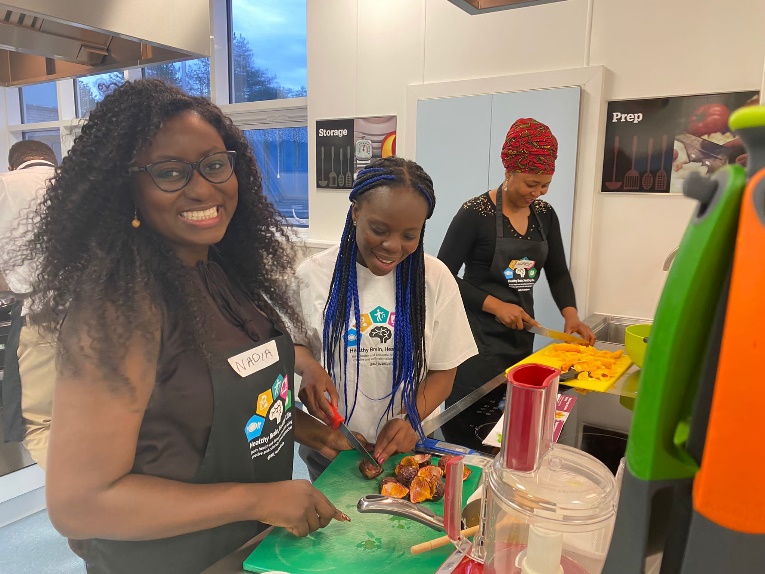
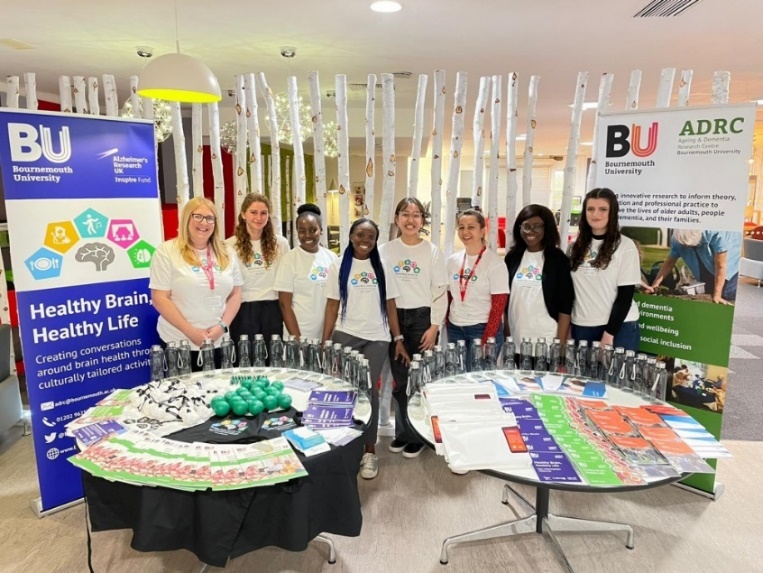
Protecting and preserving a sustainable environment
BU research found that volunteering in nature is highly beneficial for physical and mental wellbeing but finding projects that suit the needs or match the motivations of potential volunteers can be a challenge. As such, conservation organisations often struggle to increase participation in environmental volunteering.
BU’s Nature Volunteers project, funded by HEIF, uses artificial intelligence algorithms to match volunteers to suitable conservation opportunities. Over 300 UK projects have been featured from 180 organisations including the National Trust and Dorset Wildlife Trust. More than 700 opportunities have been taken up by the public.
Preparing for and recovering from crisis
BU’s Disaster Management Centre used GCRF and Participatory Research funding to improve disaster resilience in Sierra Leone through the Driving African Capacity Building in Disaster Management and Evaluating Local Disaster Management in Sierra Leone projects. Researchers recommended strategies for national policymakers and stakeholders to tackle single points of failure. They ran training workshops for councillors, community leaders, tribal chiefs, and volunteers in the 360 districts and wards of Freetown that cover disaster response for 1.2 million people. They used participatory research techniques to support local communities in Freetown to evaluate this approach. These projects equipped leaders in Sierra Leone to respond to disasters, identify single points of failure and protect communities, ultimately preventing of loss of life and enhancing resilience.
Challenging marginalisation, misinformation and under-representation
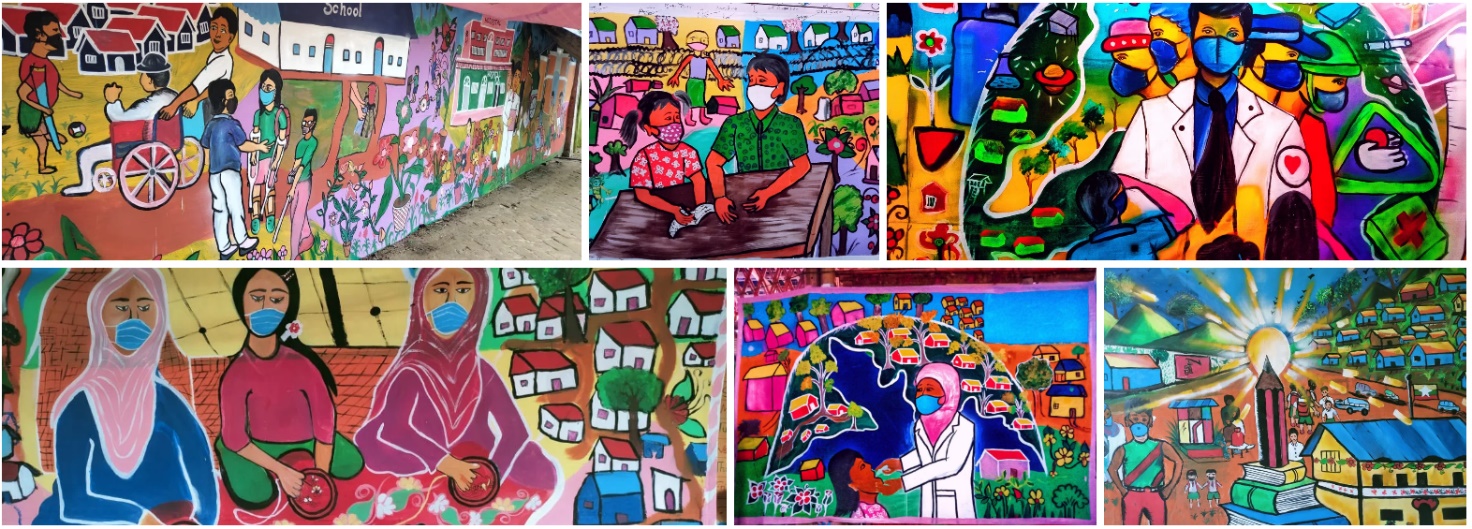
Helping creative industries and cultural heritage to thrive
BU’s Human Henge research uses Stonehenge for therapeutic participant-led activities, resulting in measurable improvements in mental health. Scaling up Human Henge, an Arts and Humanities Research Council-funded project, co-created a Culture Heritage Therapy Programme with archaeologists, artists, musicians, healthcare practitioners, and economists. Participants living with long-term mental health issues experienced creative group activities rooted in archaeology, music, dance, creative skills and the power of place, both outdoors and online. The programme promoted new social interaction, relationship building, self-awareness, and connectivity. Outcomes were presented to a public audience of 450+ people at the Megalithomania conference in May 2022, and the talk has since received 2,000+ views on YouTube.
Acting as a catalyst for growth to boost skills and advance the region
BU’s SPEED-You-UP project, funded by Interreg 2 Seas, brings together researchers, schools, welfare organisations and businesses to reduce the number of (at-risk) NEETs (Not in Education, Employment or Training) by improving employability opportunities. Entrepreneur hubs were set up in 10 schools and 13 community settings, where young people created business pop-ups to improve their local community, creating solutions to local needs. Outcomes were shared as an online exhibition.
Aspect 4: Enhancing practice
BU supports researchers to evaluate P&CE activity in a way that best suits their project. Training, one-to-one support and communities of practice enable researchers to consider evaluation at the start of each project, use suitable evaluation tools for stakeholders and audiences, and evaluate activity objectives effectively.
Supporting evaluation through training
BU provides evaluation training for researchers and partner organisations as part of the RKEDF, combining in-house expertise with support from external trainers. Additional resources are hosted on our VLE, Brightspace, with specialist support available from RDS’s PER and impact teams, PIER Officers, and external consultants for larger research projects.
Encouraging reflective practice to enable improvement
As well as evaluating outcomes for those attending P&CE activities, BU’s PER team run a survey for researchers to evaluate their experience and reflect on any initial outcomes from their PER activity. Researchers report personal and professional benefits such as increased enthusiasm, motivation, confidence, skills, new contacts, ideas for research questions and new research perspectives. Short-term outcomes include forming research and non-academic partnerships, opportunities for further P&CE activity, and funding applications to support engaged research. Follow-up surveys are conducted 6 and 12 months later to gather information on longer term outcomes and impacts.
Researchers are also asked to feedback on the training and support available at BU and suggest initiatives that would enhance their P&CE practice. This feedback is used to plan future activity.
Institutional monitoring and evaluation
Projects receiving internal funding are monitored by funding panels. Upon completion, project teams complete a final report detailing outcomes, relationships formed, and evidence of impact or anticipated future impact.
Central monitoring and evaluation of P&CE activity is linked to wider institutional reporting requirements, such as Research Excellence Framework impact case studies, HEIF accountability and annual monitoring statements, HE-BCI returns, and monitoring reports for Research England GCRF and Participatory Research allocations.
Aspect 5: Building on success
BU aims to be a leading global university, inspiring learning, advancing knowledge and enriching society through education, research and practice. Our BU2025 plan highlights the crucial role of P&CE in achieving this goal, as outlined in Aspect 1. Our six strategic areas, described in Aspects 1 and 3, implemented in early 2022 demonstrate the practical application of our approach.
Evaluating our support
In the past three years, we have invested in P&CE staff, including the recruitment of a Head of External Engagement, a Community Engagement Manager and a Health and Care Partnerships Manager. We have expanded the PIER Partnership to support colleagues across BU, beyond just health and social care, and invested in a one-year academic secondment PIER Lead and an additional PIER Officer, both appointed in 2022. Our HEIF-7 grant supports KE infrastructure, including two Impact Advisers and three KE and Business Engagement Manager posts, all appointed in 2021/22, to support our Knowledge Exchange Concordat actions and KE ambitions.
We regularly evaluate and enhance our support mechanisms for effective P&CE. Input from PER Network members shape session topics and we incorporate interactive activities, peer-led talks and discussions, and informal social and networking opportunities. Our RKEDF training sessions evolve each year to incorporate feedback from colleagues and address sector-wide challenges. After each event, we seek feedback to improve future training sessions.
During the pandemic, our RKEDF and PER Network sessions transitioned online and we enlisted external facilitators to deliver workshops for researchers on creating meaningful and engaging online content. Our overall event attendee increased, exceeding KPI targets as demonstrated in Aspect 1, and attracting diverse audiences from around the world to engage with our research. During this time, our PIER Partnership also engaged more students and members than ever before.
Monitoring and sharing progress
BU’s EEMG PESG oversees P&CE, identifying areas for improvement and making recommendations to the EEMG. Established in early 2022, the PESG aims to develop a more collaborative and sophisticated institutional plan for P&CE with a stronger evaluation framework.
We share P&CE activities and outcomes via various channels including our website, staff intranet, staff and student emails, public newsletter, research blog, and external media. Short films share outcomes from our activity, such as the Healthy Brain, Healthy Life workshops and our ESRC Festival of Social Science events. We track media coverage, social media engagement and viewing figures to monitor reach.
BU’s PIER Partnership publishes an annual report showcasing examples, testimonies and case studies of how lived experience expertise is embedded into all aspects of education and research. The reports are shared with PIER members and stakeholders and are available on BU’s website.
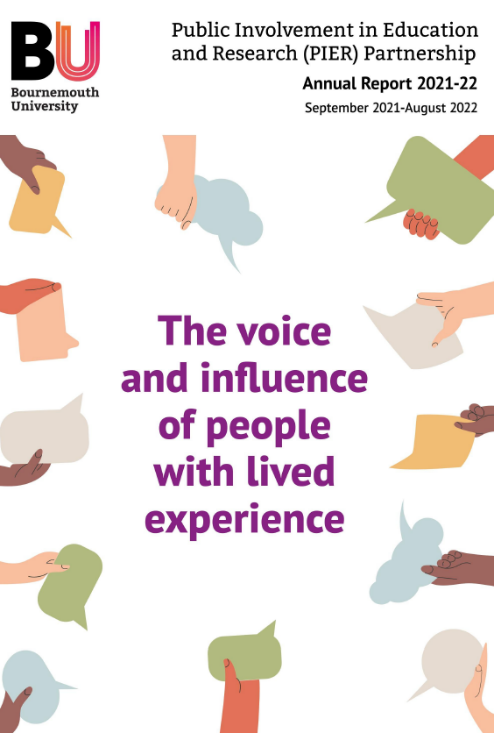
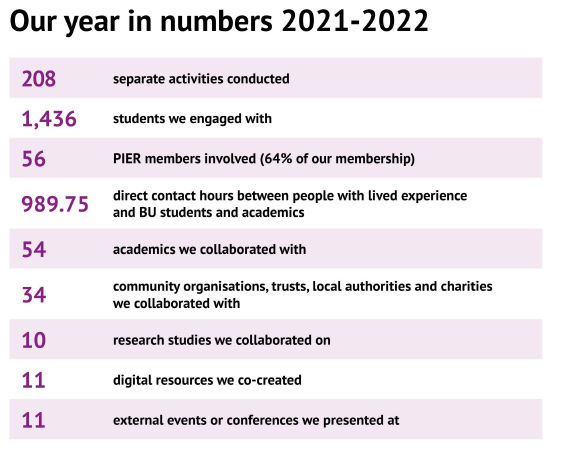
Note You are currently viewing the latest version of this narrative statement. View the previous version as published in previous iterations of the KEF (KEF1 and KEF2)